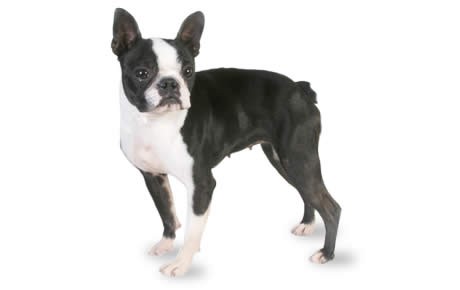Boston Terrier Breed Guide

Breed Group:
Companion Dogs
Get 30% off
Join our Newsletter
Sign Up Today
Boston Terrier Breed Information & Background
It’s a general understanding that the Boston Terrier—often referred to as the American Gentlemen—first emerged in the late 19th century in Boston, Massachusetts. However, there are multiple stories as to the dog’s true origin. While we may never know the factual telling of their lineage, most commonly the beginning of the Boston Terrier derives from Judge, a mutt bred in England from a Bulldog and a—now extinct—English Terrier.
Unlike most dog origin stories, Judge was only ever bred once. He mated with an English Terrier named Burnett’s Gyp. These two produced only one pup: a little male named Well’s Eph. Well’s Eph—although not the most aesthetically pleasing or impressive dog—was bred multiple times. One of which was to a female named Tobin’s Kate, an attractive golden brindle English Terrier. It’s said that their offspring paved the way for the Boston Terrier breed we know today.
Initially, the dogs went by the names Bullet head, Round Heads, and Bull Terriers. In the late 19th century, a group of owners started the American Bull Terrier Club, which was quickly renamed to the Boston Terrier Club. The AKC recognized the Boston Terrier breed in 1893.
With a quick rise to popularity—and, notably, a Boston Terrier at the time that doesn’t resemble the aesthetic of the breed today—the dog became one of the most popular in breeds in the US and held that status quo up until the 1960’s. A few Boston Terriers were even made famous by being beloved companions of mainstream celebrities.
In 1979, the Boston Terrier was named the official state dog of Massachusetts.
Boston Terrier Temperament & Personality
Boston Terriers did not earn the name the ‘American Gentlemen’ without having the personality and temperament to support it. Their smaller size and build, genuine empathy, and intelligence are some Boston Terrier characteristics that make them a perfect indoor family canine. Generally speaking, they are even-tempered and extroverted. With big lovable eyes they woo everyone in the room, which happens to be the affection they covet most. They are playful, often adore games, and will consider themselves an equal member of the family.
Individually, some Boston Terriers can be extremely sensitive to their owner’s moods. This archetype can make them a one-person dog, but that’s why—like most dogs—early socialization is important. While temperament should be easily manageable given the breed, an early exposure to people, other dogs, and different environments can contribute to a stable, confident, and social Boston Terrier personality.
Between males and females, it is often the female that is the alpha between them. She is often more introverted, stubborn, and mature, despite not sacrificing her undying love for her family. He is giddy, often less intelligent than females, and demonstrates more extroverted behavior.
Trainability of a Boston Terrier
Boston Terriers, with their blend of contagious enthusiasm and intelligence, are very trainable. Being that they’re often sensitive and direly in love with their owner, positive reinforcement is the route to successful training. In fact, Boston Terriers adore the mental and physical stimulation that obedience training provides. It’s an outlet for them to grow closer to their owner—all they desire—and to learn.
Early-socialization is key to developing a better temperament in adulthood. Puppy classes, while highly recommended, is not a must. A routine of obedience training can be learned online or through instructional books, and then administered. This is due in part to the homeliness of the breed. It’s important to stimulate your Boston Terrier in obedience training by teaching them tricks and games, so to not allow them time for boredom to set in. They crave mental stimulation.
Patience is a virtue you should gift yourself in the training process. While Boston Terriers are trainable, that doesn’t mean they’re easily trained. Setting aside their intelligence, their robust enthusiasm makes the housebreaking process longer than most expect. Another problem is digging. Boston Terriers love to dig. This Boston Terrier behavior can usually be fixed by allotting more time a day for physical activity and mental stimulation.
Exercise Requirements for the Boston Terrier
Boston Terriers do not need much exercise. A brisk walk—anywhere from 15-30 minutes—4-5 times a week should suffice. Be sure to consider the weather when taking these walks, as their facial structure and thin coats make them prone to overheating or suffering in the cold. Often, their need for exercise might not match their desire for it. An energetic and enthusiastic Boston Terrier—more commonly the female—will want more exercise than normal.
Their playfulness often contributes to their daily exercise. Throw a ball to a Boston Terrier and they will chase it around for hours. While you should never allow your Boston Terrier—or any dog—to succumb to the life of a coach potato, their quantity of exercise greatly depends on their personality. A rare phenomenon in dog breeds, some owners claim their Boston Terrier needs little exercise and remain behaved and healthy, while others walk theirs miles a day.
Boston Terrier Life Span & Longevity
A Boston Terrier life span ranges anywhere between 13-15 years.
Boston Terrier Breed Popularity
As of 2017, the Boston Terrier ranks 21st on the AKC’s list of 155 registered dog breeds. Their playful habits, undying love for their family, sharp intelligence, and smaller size make them a perfect family dog. While the height of their popularity reached its zenith in the middle of the 20th century, they’re still an American favorite and for good reason.
Boston Terrier Food Recommendations
The recommended feeding process for a Boston Terrier is a half cup to a cup and a half of dry food per day, divided into two equal meals. As pups they will most likely require an extra third of the portion, but this needs to be balanced with physical activity. Beware that Boston Terriers can be glutinous creatures and prone to having large appetites. Or—on the opposite side of the spectrum—they can be fickle and picky about their food.
High-quality food usually solves the latter problem. Due to the pickiness and hunger of the Boston Terrier, it’s important the owner carefully monitors their food intake and balances it against their weight fluctuations, exercise, and past history.
How to Groom a Boston Terrier
Perpetually considered to have the best attire, the Boston Terrier has a silky smooth, sleek coat that comes in three colors. They’re black, black with a hue of magenta in sunlight, or brindle colored. Each has a white muzzle, face, and chest, which give them—and this is perhaps why they were loved by celebrities—the tuxedo look.
Maintaining a Boston Terrier’s coat is easy work. Brush their coat once a week with a bristle brush to keep their fur slick and mitigate any shedding. Bathe when needed, but a routine schedule is unnecessary. To maintain their hygiene, be sure to brush their teeth twice a day to avoid tartar and bacteria buildups. Trim their nails 1-2 times a month; don’t expect their activities to naturally wear them down, as they’re indoor dogs. A daily face wash is recommended due to the robustness of their eyes—as they will be more prone to infection. Check their ears for infection and probe their coats for dentures, rashes, and inflammations. A telltale sign of infection is odor.
For optimal Boston Terrier health, begin these routine checkups and cleanings when the Boston Terrier is a pup. Use them as part of their obedience training and touch their paws, coat, and face to accustom them to the routine. This will allow for easier upkeep in the future.
Are Boston Terriers Good with Kids?
Boston Terriers are fantastic with children. They love to play and have an unsuspecting amount of energy for a home dog, which parallels the youngsters. They’re not big enough to throw their weight around and—potentially—harm children in an accident. But they’re just the perfect size not to suffer any injuries of their own. By in large, they are great with children and love them immensely. This reality is evermore present if the pup is socialized early on.
Boston Terrier Health Issues
Boston Terriers are generally a healthy breed. Their health problems often arise from their facial structure, but even then they’re not common. As with any dog breed, it’s important that—before a puppy is purchased—the parents are identified, evaluated, and the breeder can provide health clearances from validated establishments. The illnesses and diseases that can afflict a Boston Terrier are as follows:
Cataracts: this condition causes the eye lens to cloud over, and impairs eyesight. It’s only natural that with such large eyes, Boston Terrier cataracts can become an issue. However, Juvenile Cataracts can be detected as early as eight weeks in the puppy’s life. When purchasing a Boston Terrier, it is wise to ask the breeder if they’ve had their litter professionally examined for cataracts.
Cherry Eye: yet another Boston Terrier eye problem, cherry eye is a prolapse in the gland in one of their eyelids. A surgical operation can reposition the gland or remove it entirely. This procedure is widely practiced and often successful at curing Boston Terrier cherry eye.
Patellar Luxation: this condition is most frequently an issue with smaller dogs, and it occurs when the patella is not properly aligned. Symptoms include Boston Terrier leg problems in the form of lameness in the leg(s) or an abnormal form of movement. Patellar Luxation is a genetic disorder and one that—while present at birth—only affects the dog in later years. Surgery can be required to realign the patella.
Deafness: Boston Terriers are prone to deafness. In either one or both ears, overtime they can experience partial or complete hearing loss. Similar to Cataracts, a puppy can undergo a BAER test to identify the quality of their hearing before they’re assigned to new families. Studies have shown that Boston Terrier with a coat—one third of the coloring being white—are more prone to deafness.
Mageasophagus: this condition occurs when the Boston Terrier’s esophagus does not properly develop. Symptoms include the regurgitation of undigested food, which in turns leads to malnutrition, being that the canine will be unable to process their nutrients. This can be particularly threatening when the Boston Terrier continuously rejects its food, which in turn requires excessive medical attention.
Other Resources
National Breed Website: The Boston Terrier Club of America
Rescues: American Boston Terrier Rescue





